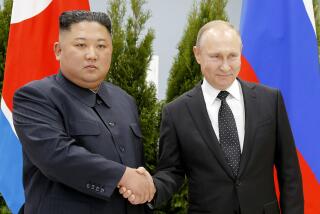Chinese, Soviets to Trade Visits at High Level
- Share via
UNITED NATIONS — Chinese Foreign Minister Qian Qichen agreed Wednesday to travel to the Soviet Union later this year for the first such high-level state visit in a quarter of a century.
A spokesman for the Soviet Foreign Ministry, Gennady I. Gerasimov, said Qian accepted an invitation to visit Moscow in the course of a meeting here with Soviet Foreign Minister Eduard A. Shevardnadze. He said Shevardnadze will visit Beijing early next year.
“The world situation improved with improvement of Soviet-American relations, and maybe it’s time to improve Soviet-Chinese relations as well,” Gerasimov told reporters.
He said Qian will meet with Soviet leader Mikhail S. Gorbachev while in Moscow. And he said Moscow hopes that the visits by the foreign ministers will lead to a Sino-Soviet summit meeting at which the reconciliation of the two countries could be sealed.
“It is time that relations are normalized,” Gerasimov said.
A Chinese source said later that the visit, for which dates have not been fixed, will be “a big step” and will almost certainly lead to a summit meeting sometime next year.
Relations between the two governments have gradually improved over the past decade, and there have been regular meetings at the level of deputy foreign minister for most of that period.
Afghan Pullout a Factor
Moscow’s agreement to end its occupation of Afghanistan removed one of the most troublesome sources of friction between the two countries.
China and the Soviet Union split over a series of policy and ideological differences in the 1960s. For a time, each considered the other to be its bitterest enemy.
Mutual animosity toward the Soviet Union formed the basis of the U.S. rapprochement with China, which began with President Richard M. Nixon’s visit to China in 1972.
George Carver, a former deputy director of the CIA, said that for years U.S. and Chinese diplomats have been reassuring each other that despite their differences on a wide variety of issues, “we agree the Soviets are up to no good.”
Wary of Warmer Ties
“I’d rather have the Chinese talking to us about how both of us can restrain the Soviets than have the Soviets and the Chinese talking about what they can do behind our back,” Carver, who was born in China, said.
For a time, China was suspicious of any improvement in relations between the United States and the Soviet Union. Chinese officials often warned of the danger of a superpower conspiracy against the interests of China and the Third World.
But in his speech Wednesday to the General Assembly, Qian said that the Washington-Moscow thaw, symbolized by President Reagan’s meetings with Gorbachev, is a positive development.
“Dialogue is playing an increasingly prominent role in improving the international situation,” Qian said. “There has been frequent dialogue between the United States and the Soviet Union. It is a welcome development that the United States and the Soviet Union have taken a step forward on the road to disarmament.”
Focused on Cambodia
Soviet spokesman Gerasimov said much of the Shevardnadze-Qian meeting at the United Nations was devoted to the situation in Cambodia, where a Vietnamese-installed government is kept in power by Vietnamese troops.
The Soviet Union is Vietnam’s closest ally; China has long demanded a withdrawal of Hanoi’s forces from Vietnam.
In his speech, Qian said: “Following the decision of the Soviet Union to pull its troops out of Afghanistan, the international community has voiced an even stronger demand for Vietnamese troop withdrawal from Kampuchea (Cambodia) and for an end to the war of aggression. Regrettably, however, what the Vietnamese authorities have been doing runs counter to the desire and the demand of the international community.”
Backs 4-Party Coalition
Qian said China is proposing a four-party coalition government headed by Prince Norodom Sihanouk, a former ruler of Cambodia. Such a government would include representatives of the present regime, two pro-Western factions and the Khmer Rouge. The Khmer Rouge is blamed for killing more than a million Cambodians when it held power in the late 1970s. Although the United States backs Sihanouk, Washington opposes any settlement that would give the Khmer Rouge a share of power.
“We are against the exclusion of any of the four factions . . . or the exercise of power by any one faction alone,” Qian said. He called for a moratorium on military action by the armed forces of the four factions.
Times staff writer Don Shannon contributed to this story.
More to Read
Sign up for Essential California
The most important California stories and recommendations in your inbox every morning.
You may occasionally receive promotional content from the Los Angeles Times.










